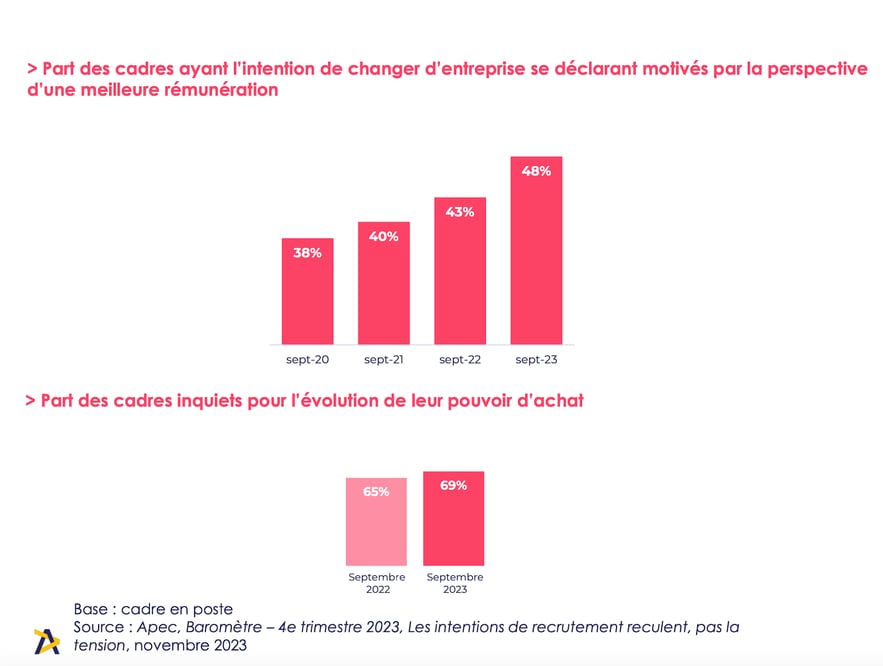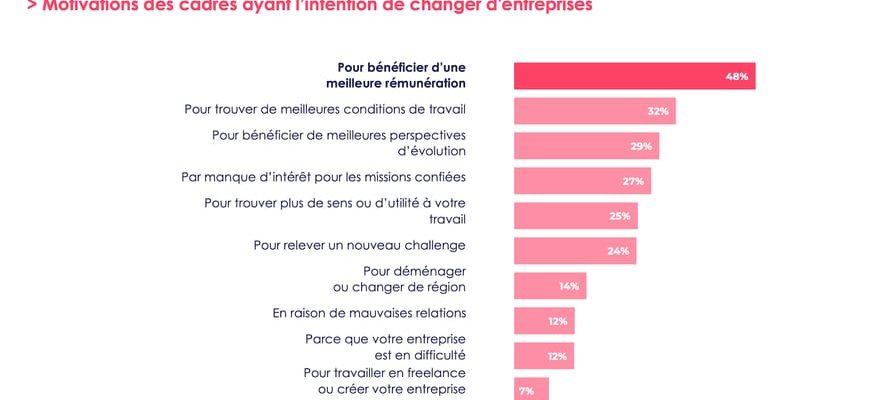Gone are the days when we read on everyone’s lips the famous “work more to earn more”. In 2023, the new leitmotif now sounds like this: “Change companies to earn more”. In any case, this is what demonstrates the barometer of the Association for Executive Employment (Apec)*published this Thursday, November 9.
According to the organization, 44% of executives believe that they could earn “significantly more” by changing structure. This, even though only 29% thought so in September 2022. Up 15% this year, this idea continues to gain ground. And executives under 35 are even more convinced of this. More than half of them say so.
Unsurprisingly, therefore, the increase in remuneration is at the top of the list of reasons which push executives, of all ages, to leave their company for new professional experiences. Far ahead of the search for more pleasant working conditions, or better prospects for advancement.
Better remuneration, 1st motivation in intentions to change employers
© / Apec, Barometer
According to the Apec barometer, the share of executives “intent to change companies” for salary reasons is also constantly increasing. While there were only 38% in September 2020, today almost 50% want to leave their employer, attracted by more attractive remuneration.
Changing companies, a relative remuneration booster
And for good reason, three out of four executives who changed companies without going through unemployment benefited from a salary increase in 2022, compared to only 55% of those who remained in the same company.
However, depending on the conditions in which the change in structure takes place, the chances of seeing one’s salary increase vary. For example, only 47% of employees who had a period of inactivity before starting work in a new company saw their salary increase. Compared to 72% for those who changed positions while remaining in the same structure. Enough to somewhat qualify the benefits of external mobility which has never been so popular.
But while longevity in a company has long been synonymous with stability and financial security, how can we explain that more and more executives want to take the plunge?
Inflation, decline in purchasing power
Faced with inflation which has hit France hard since the outbreak of the war in Ukraine, the primary concern of the French remains purchasing power which has continued to be eroded since the end of the health crisis, and the gradual abandonment of “Whatever it takes”.
A growing concern, from which executives are not exempt. 69% of them say they are concerned about this, i.e. 4 points more than in September 2022. Behind the desire to increase their salary, therefore, lies the desire to compensate for a drop in living standards. Especially since between 2019 and 2023, executives lost more purchasing power than workers and employees. A decline of 2.9 points, compared to 0.4 points for the seconds.

Share of executives intending to change company declaring themselves motivated by the prospect of better remuneration (top). And share of executives intending to change companies declaring themselves motivated by the prospect of better remuneration (bottom)
© / Apec, Barometer
Beyond the very sensitive issue of purchasing power, “the job market remains particularly favorable to mobility depending on executives”, points out Apec. 56% perceive it as an opportunity. Each year, the proportion of executives believing that it would be easy to find a job increases. They were 47% in 2022. They are 49% in 2023.
Several avenues which explain that 37% of executives today intend to take active steps over the next twelve months to change companies. 14% of them plan to do so in the coming quarter.
* This Apec publication is based on an online survey conducted with a sample of 2,000 executives and a telephone survey with a sample of 1,000 companies.
